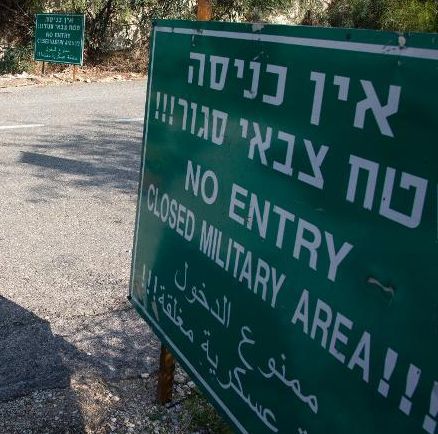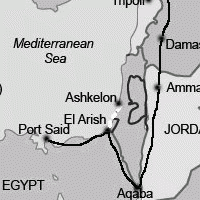![]()
RubinReports | By Barry Rubin

Road sign near the Rosh Hanikra border crossing on the Israeli-Lebanese border. A Lebanese army sniper killed an Israeli soldier as he drove along the border between the two countries. The soldier killed was identified as Shlomi Cohen, 31, from the northern Israeli city of Afula. Israel retaliated in the early hours of Monday morning by shooting two Lebanese soldiers. (AFP)
On December 15, an Israeli jeep was driving along the Israel-Lebanese border near the coast, in a quiet area, which hadn’t seen war for decades. Suddenly a shot rang out. A warrant officer fell dead, but he wasn’t killed by a “terrorist.” Apparently he had been shot by a uniformed soldier of the Lebanese army. Let’s consider this situation under the America’s supposed security protection of Israel.
Is Lebanon going to court martial this soldier? Is the United States going to demand that he be punished? Will the United States do anything? Remember that the U.S. will be subsidizing Iran, and who knows what else. Moreover, the United States will try to restrain any Israeli actions. This person is going to get away with murder, and no one will criticize him, but rather compliment him.
This is going to pose daily questions of U.S. policy (true I know this is a Lebanese not Palestinian soldier, but the principal is the same). What if the soldiers had been a few dozen miles away? The United States is obviously going to regret this action but is not going to do anything. It will try to restrain Israel. And meanwhile Lebanon, Syria, and other countries are going to act like they are at war with Israel, but the United States will not allow Israel to act like it is at war with them.
How about if Hizballah had shot the soldier. This means that an Israeli soldier was shot by what is a de facto ally of the United States. After all, the United States has likely provided Iran with some 20 billion dollars, cut sanctions, and won’t do anything about the situation. What do Israelis gain? A “frequent friar [Hebrew for sucker] card”?
Does the United States want to get into this situation, the middle of an Arab-Israeli conflict that has gone on for 66 years? As I have pointed out many times, this will be a disaster.
The current stage of peace negotiations are the following: The U.S. has offered American troops to be in the West Bank and Gaza Strip for 10 years. How many soldiers will there be? What is their designated mission? Do you really think the U.S. will have thousands of soldiers in Israel and Palestine for a decade? I don’t believe this will happen. I repeat, either this will be a disaster or will not happen.
Here is an interesting option. Suppose the Obama administration draws negotiations out to the end of 2014? Certainly parties would like to do that; they are in no hurry. Then negotiations are drawn out during the campaign, and then the day after voting, they collapse. Wouldn’t the Democratic Party achieve a great voter turnout, considering the Arab-Israeli conflict and the Iran conflicts are solved? And then Obama would announce that U.S. interests cannot make the concessions to create peace. In other words, he would get the value of the campaign slogans but then does not deliver.
In other words, if you want this conflict, you can keep this conflict. Don’t be surprised at this prediction.
Barry Rubin is director of the Global Research in International Affairs (GLORIA) Center and editor of the Middle East Review of International Affairs (MERIA) Journal. His next book, “Nazis, Islamists and the Making of the Modern Middle East,” written with Wolfgang G. Schwanitz, will be published by Yale University Press, available February 25, 2014. Pre-order here. His latest book is “Israel: An Introduction,” also published by Yale. Thirteen of his books can be read and downloaded for free at the website of the GLORIA Center including “The Arab States and the Palestine Conflict,” “The Long War for Freedom: The Arab Struggle for Democracy in the Middle East” and “The Truth About Syria.” His blog is Rubin Reports. His original articles are published at PJMedia.



 RSS
RSS










Latest Comments
Hello Mike, Thank you for your positive feedback to the article. I felt there wasn’t too much critical analysis of ...
Thanks for this considered and well constructed article. A follow up article on the manner in which the editorial contro...
THE CLUELESSNESS OF CLAIMING THAT OBAMA'S MIDDLE EAST POLICIES WERE A FAILURE CANNOT BE FURTHER FROM THE TRUTH, WHAT THE...
As long as Obama is the president of the usa do not trust the us government......
Thank you for an good read....